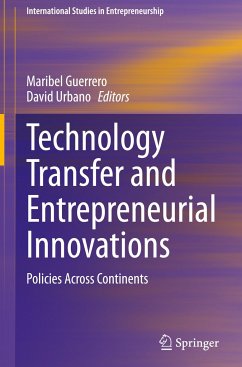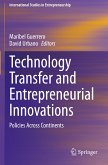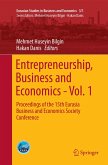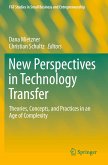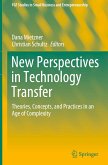Technology Transfer and Entrepreneurial Innovations
Policies Across Continents
Herausgegeben:Guerrero, Maribel; Urbano, David
Technology Transfer and Entrepreneurial Innovations
Policies Across Continents
Herausgegeben:Guerrero, Maribel; Urbano, David
- Gebundenes Buch
- Merkliste
- Auf die Merkliste
- Bewerten Bewerten
- Teilen
- Produkt teilen
- Produkterinnerung
- Produkterinnerung
Evidence suggests that economies with technology transfer initiatives provide a better supply of high-quality jobs and tend to be characterized by entrepreneurs with higher innovation contributions. This book explores the effectiveness of technology transfer policies and legislation on entrepreneurial innovation in a non-US context. It analyses the theoretical, empirical and managerial implications behind the success of technology transfer polices and legislations in stimulating entrepreneurial innovation; analyses which other contextual condition (e.g., culture) are necessary for successful…mehr
Andere Kunden interessierten sich auch für
![Technology Transfer and Entrepreneurial Innovations Technology Transfer and Entrepreneurial Innovations]() Technology Transfer and Entrepreneurial Innovations137,99 €
Technology Transfer and Entrepreneurial Innovations137,99 €![Sport Entrepreneurship Sport Entrepreneurship]() Vanessa RattenSport Entrepreneurship61,99 €
Vanessa RattenSport Entrepreneurship61,99 €![Entrepreneurship, Business and Economics - Vol. 1 Entrepreneurship, Business and Economics - Vol. 1]() Entrepreneurship, Business and Economics - Vol. 1161,99 €
Entrepreneurship, Business and Economics - Vol. 1161,99 €![New Perspectives in Technology Transfer New Perspectives in Technology Transfer]() New Perspectives in Technology Transfer171,19 €
New Perspectives in Technology Transfer171,19 €![Sport Entrepreneurship Sport Entrepreneurship]() Vanessa RattenSport Entrepreneurship41,99 €
Vanessa RattenSport Entrepreneurship41,99 €![New Perspectives in Technology Transfer New Perspectives in Technology Transfer]() New Perspectives in Technology Transfer129,99 €
New Perspectives in Technology Transfer129,99 €![Technology Technology]() Technology81,99 €
Technology81,99 €-
-
-
Evidence suggests that economies with technology transfer initiatives provide a better supply of high-quality jobs and tend to be characterized by entrepreneurs with higher innovation contributions. This book explores the effectiveness of technology transfer policies and legislation on entrepreneurial innovation in a non-US context. It analyses the theoretical, empirical and managerial implications behind the success of technology transfer polices and legislations in stimulating entrepreneurial innovation; analyses which other contextual condition (e.g., culture) are necessary for successful implementation; and explores the extent and level of replication of US policies (e.g., Bayh-Dole Act, Small Business Innovation Research [SBIR] program) in other national and regional systems. In addition, this book looks at the effect technology transfer policies have on the adoption of open innovation and open science.
Produktdetails
- Produktdetails
- International Studies in Entrepreneurship 51
- Verlag: Springer / Springer International Publishing / Springer, Berlin
- Artikelnr. des Verlages: 978-3-030-70021-8
- 1st edition 2021
- Seitenzahl: 336
- Erscheinungstermin: 2. Juni 2021
- Englisch
- Abmessung: 241mm x 160mm x 24mm
- Gewicht: 670g
- ISBN-13: 9783030700218
- ISBN-10: 3030700216
- Artikelnr.: 60967528
- Herstellerkennzeichnung
- Books on Demand GmbH
- In de Tarpen 42
- 22848 Norderstedt
- info@bod.de
- 040 53433511
- International Studies in Entrepreneurship 51
- Verlag: Springer / Springer International Publishing / Springer, Berlin
- Artikelnr. des Verlages: 978-3-030-70021-8
- 1st edition 2021
- Seitenzahl: 336
- Erscheinungstermin: 2. Juni 2021
- Englisch
- Abmessung: 241mm x 160mm x 24mm
- Gewicht: 670g
- ISBN-13: 9783030700218
- ISBN-10: 3030700216
- Artikelnr.: 60967528
- Herstellerkennzeichnung
- Books on Demand GmbH
- In de Tarpen 42
- 22848 Norderstedt
- info@bod.de
- 040 53433511
Maribel Guerrero is Associate Professor of Entrepreneurship at the Newcastle Business School, Northumbria University (UK). She is also a Research Professor in the Faculty of Economics and Business at Universidad del Desarrollo (Chile). Her main research interests are focused on the conditioning factors of entrepreneurship inside existing organizations (e.g., entrepreneurial universities, academic entrepreneurship, corporate entrepreneurship, intrapreneurial employees) and on the context-specific link between entrepreneurial activities and socio-economic development in different contexts. David Urbano is Professor and Vice Dean of Entrepreneurship at Universitat Autónoma de Barcelona (UAB) and ICREA-Academia Research Fellow, Barcelona, Spain. He is also Deputy Director at the Centre for Entrepreneurship and Social Innovation Research (CREIS) at UAB. His research focuses on the analysis of factors affecting entrepreneurship in different contexts, using the institutional approach as a theoretical framework, and combining quantitative methodologies.
Chapter 1: Effectiveness of technology transfer policies in fostering entrepreneurial innovations across continents. Maribel Guerrero [Newcastle Business School] & David Urbano [Universitat Autonoma de Barcelona] North America.- Chapter 2: The economic benefits of technology transfer in U.S. Albert N. Link [University of North Carolina at Greensboro] & John T. Scott [Dartmouth College].- Chapter 3: Changing times for universities by technology transfer policies in Cuba: Damaris Cruz [Universidad de la Habana], Maribel Guerrero [Newcastle Business School] & Alma Delia Hernández [Universidad de la Habana].- Chapter 4: Public-private collaboration for enhance science-based entrepreneurship in Mexico. José Ernesto Amorós [EGADE Business School, Tecnológico de Monterrey; Universidad del Desarrollo] & Elda Barrón [Universidad de Monterrey] South America.- Chapter 5: R+D transfer and ambitious entrepreneurship: Evidence from Latin American countries. José Ernesto Amorós [EGADEBusiness School, Tecnológico de Monterrey; Universidad del Desarrollo], Carlos Poblete [Universidad del Desarrollo] & Vesna Mandakovic [Universidad del Desarrollo].- Chapter 6: Technology transfer policies and entrepreneurial innovations in Brazil. Bruno Fisher [University of Campinas], Maribel Guerrero [Newcastle Business School] & Paola Schaeffer [University of Campinas].- Chapter 7: The technology transfer policies and universities' impacts in Chile. Matías Lira [Universidad del Desarrollo] & Maribel Guerrero [Newcastle Business School] Europe.- Chapter 8: Antecedents and consequences of innovation via R&D: Evidence from Europe. David Urbano [Universitat Autonoma de Barcelona], Andrew Turro [Universitat Autonoma de Barcelona] & Sebastian Aparicio [Durham Univerisity].- Chapter 9: The intellectual property rights on country-level R&D and individual-level entrepreneurial performance in Europe. André van Stel [Trinity College Dublin, Kozminski University, Serhiy Lyalkov [Center for Entrepreneurship, Kozminski University, Warsaw, Poland], Ana Millán [University Pablo de Olavide], & José María Millán [University of Huelva].- Chapter 10: The Impact of University Focused Technology Transfer Policies on Regional Innovation and Entrepreneurship in Germany. James A. Cunningham [Northumbria University, Newcastle Business School], Erik E. Lehmann [University of Augsburg], Matthias Menter [Friedrich Schiller University Jena] & Nikolaus Seitz [University of Augsburg] Transition Europe.- Chapter 11: The Croatian technology transfer path from socialism to European membership. Jadranka Svarc [Institute Ivo Pila] & Prof. Marina Dabic [University of Zagreb].- Chapter 12: Evolution of technology transfer activities in Belarus. Natalja Apanasovich [Belarous State University], Radzivon Marozau [BEROC Institute] & Maribel Guerrero [Newcastle Business School] Africa.- Chapter 13: Technology Transfer Efficiency in Egypt. Hala El Hadidi [The British University in Egypt] & Professor David A. Kirby [The British University in Egypt].- Chapter 14: Technology Transfer Policies in the Chinese-African JV. Roseline Wanjiru [Newcastle Business School] & Maribel Guerrero [Newcastle Business School].
Chapter 1: Effectiveness of technology transfer policies in fostering entrepreneurial innovations across continents. Maribel Guerrero [Newcastle Business School] & David Urbano [Universitat Autonoma de Barcelona] North America.- Chapter 2: The economic benefits of technology transfer in U.S. Albert N. Link [University of North Carolina at Greensboro] & John T. Scott [Dartmouth College].- Chapter 3: Changing times for universities by technology transfer policies in Cuba: Damaris Cruz [Universidad de la Habana], Maribel Guerrero [Newcastle Business School] & Alma Delia Hernández [Universidad de la Habana].- Chapter 4: Public-private collaboration for enhance science-based entrepreneurship in Mexico. José Ernesto Amorós [EGADE Business School, Tecnológico de Monterrey; Universidad del Desarrollo] & Elda Barrón [Universidad de Monterrey] South America.- Chapter 5: R+D transfer and ambitious entrepreneurship: Evidence from Latin American countries. José Ernesto Amorós [EGADEBusiness School, Tecnológico de Monterrey; Universidad del Desarrollo], Carlos Poblete [Universidad del Desarrollo] & Vesna Mandakovic [Universidad del Desarrollo].- Chapter 6: Technology transfer policies and entrepreneurial innovations in Brazil. Bruno Fisher [University of Campinas], Maribel Guerrero [Newcastle Business School] & Paola Schaeffer [University of Campinas].- Chapter 7: The technology transfer policies and universities' impacts in Chile. Matías Lira [Universidad del Desarrollo] & Maribel Guerrero [Newcastle Business School] Europe.- Chapter 8: Antecedents and consequences of innovation via R&D: Evidence from Europe. David Urbano [Universitat Autonoma de Barcelona], Andrew Turro [Universitat Autonoma de Barcelona] & Sebastian Aparicio [Durham Univerisity].- Chapter 9: The intellectual property rights on country-level R&D and individual-level entrepreneurial performance in Europe. André van Stel [Trinity College Dublin, Kozminski University, Serhiy Lyalkov [Center for Entrepreneurship, Kozminski University, Warsaw, Poland], Ana Millán [University Pablo de Olavide], & José María Millán [University of Huelva].- Chapter 10: The Impact of University Focused Technology Transfer Policies on Regional Innovation and Entrepreneurship in Germany. James A. Cunningham [Northumbria University, Newcastle Business School], Erik E. Lehmann [University of Augsburg], Matthias Menter [Friedrich Schiller University Jena] & Nikolaus Seitz [University of Augsburg] Transition Europe.- Chapter 11: The Croatian technology transfer path from socialism to European membership. Jadranka Svarc [Institute Ivo Pila] & Prof. Marina Dabic [University of Zagreb].- Chapter 12: Evolution of technology transfer activities in Belarus. Natalja Apanasovich [Belarous State University], Radzivon Marozau [BEROC Institute] & Maribel Guerrero [Newcastle Business School] Africa.- Chapter 13: Technology Transfer Efficiency in Egypt. Hala El Hadidi [The British University in Egypt] & Professor David A. Kirby [The British University in Egypt].- Chapter 14: Technology Transfer Policies in the Chinese-African JV. Roseline Wanjiru [Newcastle Business School] & Maribel Guerrero [Newcastle Business School].

